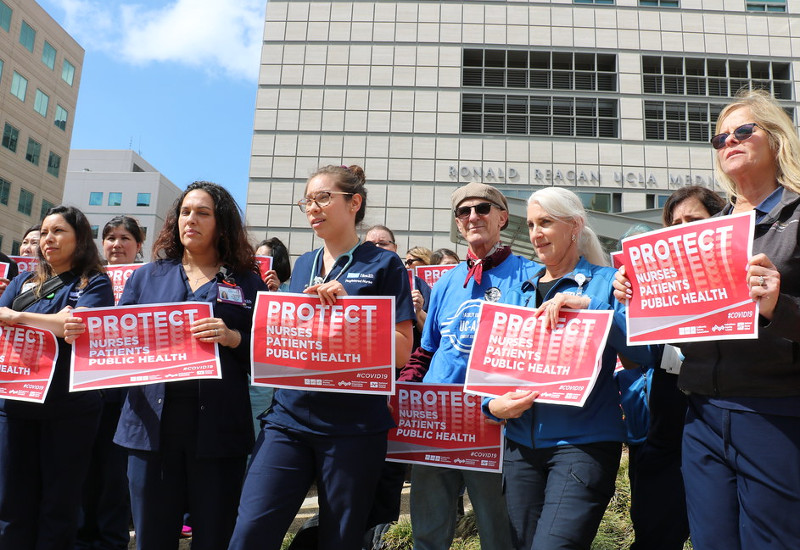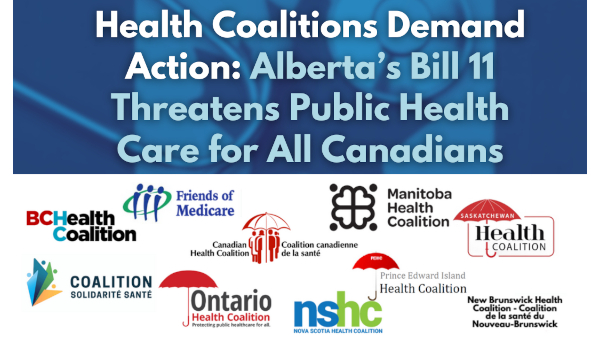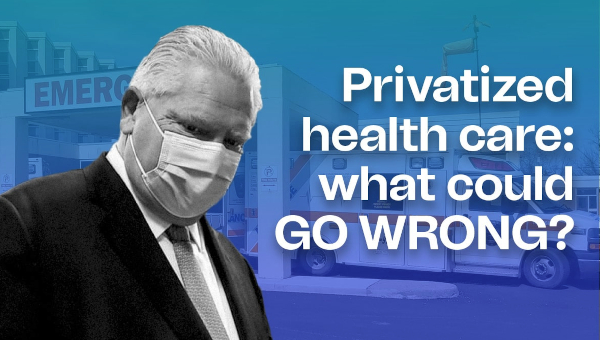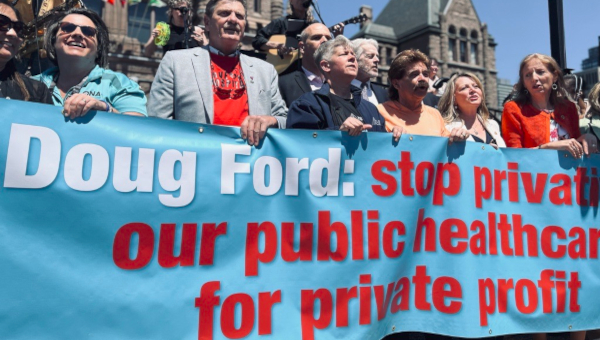Coronavirus Statements from Canadian and American Nurses’ Unions
Safety Is Not Negotiable for Anyone – Including Healthcare Workers
The following is a joint statement issued March 13 by the Canadian Labour Congress (CLC), the Canadian Federation of Nurses Unions (CFNU), the Canadian Union of Public Employees (CUPE), Unifor, the National Union of Public and General Employees (NUPGE) and the Service Employees International Union (SEIU).

As labour organizations representing close to a million healthcare workers, we are calling for the Public Health Agency of Canada and all provincial public health offices to protect healthcare workers and their patients during the COVID-19 pandemic. We are also urging decision-makers to adhere to the precautionary principle, which calls for reasonable safeguards when a virus is clouded in scientific uncertainty.
Our healthcare system is already running over capacity; we simply cannot afford to erode staffing levels any further if healthcare workers become sick and self-quarantine. It is therefore imperative that we protect healthcare workers so that they can continue to provide safe and effective care.
To health ministers and health employers, we say: this responsibility lies with you. To stop the transmission of COVID-19, healthcare workers must be equipped with the appropriate fit-tested personal protective equipment. Employers must provide the necessary training and supports – and they must mandate point-of-care risk assessments that empower healthcare workers to assess their own risk and act accordingly.
Latest Updates
In its most recent update on COVID-19, the United States’ Centers for Disease Control and Prevention notes that the science remains uncertain on how the virus is transmitted:
“[Respiratory droplets] can land in the mouths, noses, or eyes of people who are nearby or possibly be inhaled into the lungs of those within close proximity. The contribution of small respirable particles, sometimes called aerosols or droplet nuclei, to close-proximity transmission is currently uncertain.”
In addition, a recent study awaiting peer review from scientists at Princeton University, the University of California-Los Angeles and the National Institutes of Health (NIH), posted online Wednesday, suggests that the virus may also be spread through the airborne route (aerosols) or contact with physical objects. The researchers state that “the virus can remain viable and infectious in aerosols for multiple hours and on surfaces up to days.”
In light of conflicting scientific evidence on how the virus is spread, the precautionary principle must be followed; we must err on the side of caution.
Protect Frontline Workers
A recent legal opinion posted by a leading Canadian law firm Osler, Hoskin & Harcourt LLP makes clear that hospitals should defer to “an elevated duty of precautionary care” (which would include droplet, contact and airborne precautions, as in other international jurisdictions). Given the current scientific uncertainty, the firm is cautioning hospitals to review their pandemic plans so that they “reflect the legal lessons learned from the SARS outbreak, including the SARS Commission final report.”
If there is a shortage of personal protective equipment, union leaders can work with governments and health authorities to implement strategies that focus on reducing hazardous exposures to keep frontline healthcare workers safe.
During this pandemic, our members are going to work – they are caring for Canadians and putting their health at risk to help contain the spread of COVID-19.
The strength of our healthcare system rests on our doctors, nurses, health science professionals, allied health workers, EMS personnel, DSWs, PSWs, healthcare aides, orderlies, cleaners, food service workers and others; to treat patients and keep the broader public safe, they need to be protected.
Since the start of this pandemic, unions representing workers in the healthcare sector have been urging the federal and provincial governments, as well as healthcare employers, to err on the side of caution – to be safe rather than sorry. We stand by the precautionary principle – a key lesson from the SARS epidemic – and we expect governments and employers to do the same.
Safety is not negotiable! •
Signed:
- Hassan Yussuff, President, Canadian Labour Congress (CLC)
- Linda Silas, President, Canadian Federation of Nurses Unions (CFNU)
- Mark Hancock, President, Canadian Union of Public Employees (CUPE)
- Sharleen Stewart, President, Service Employees International Union (SEIU)
- Larry Brown, President, National Union of Public and General Employees (NUPGE)
- Jerry Dias, President, Unifor
Day of Action to Demand Protections for Nurses, Patients, Public
National Nurses United
Registered nurses are outraged to learn that the Centers for Disease Control (CDC) further weakened its guidance on measures to contain COVID-19. These changes include, among other things, rolling back personal protective equipment (PPE) standards from N-95 respirators to allow simple surgical masks; not requiring suspected or confirmed COVID-19 patients to be placed in negative pressure isolation rooms at all times; and weakening protections for healthcare workers collecting diagnostic respiratory specimens. These are moves that National Nurses United nurses say will gravely endanger nurses, healthcare workers, patients, and our communities.

To protest the ineffective employer and government response to COVID-19 and demand protections now, nurses held a national day of action on Wednesday, March 11, 2020, said the California Nurses Association/National Nurses Organizing Committee (CNA/NNOC) and National Nurses United. Nurses are fighting back collectively by holding rallies, press conferences, and solidarity actions across the country to demand optimal screening and isolation procedures and policies, staffing, PPE, training and education, and more.
“If nurses and healthcare workers aren’t protected, that means patients and the public are not protected,” said Bonnie Castillo, RN and CNA/NNOC and NNU executive director. “This is a major public health crisis of unknown proportions. Now is not the time to be weakening our standards and protections, or cutting corners. Now is the time we should be stepping up our efforts.”
CNA/NNOC and NNU note that some states, such as California, can maintain a higher standard of infectious disease protections for workers. In California, nurses and healthcare workers are protected by Cal-OSHA’s aerosol transmissible diseases standard, and Castillo said it is critical that the state hold the line on public health by vigorously enforcing those rules.
In addition to lobbying almost every federal health agency, the presidential administration, and members of Congress, and California health agencies to step up protections, NNU recently surveyed RNs nationwide, finding that the vast majority of the nation’s healthcare facilities are unprepared for COVID-19, with only 29 per cent of nurses reporting that their hospitals have a plan in place to isolate a coronavirus patient, and only 30 per cent saying their employer has enough personal protective equipment if there is a rapid surge in patients with possible COVID-19 infections.
Many hospitals and healthcare facilities have failed to provide adequate personal protective equipment to nurses working with COVID-19 patients. Some facilities are telling nurses to continue to work while asymptomatic, even though they’ve been exposed to the virus and might be contagious. Testing at hospitals has been sporadic.
“We follow the precautionary principle, which means we shouldn’t wait for harm to occur before we take action to protect people’s health,” said Cathy Kennedy, RN at Kaiser Roseville. •
This article first published on the nationalnursesunited.org website.
NNU Statement on Trump Administration Press Conference
National Nurses United
The following statement by National Nurses United Executive Director Bonnie Castillo, RN and Presidents Jean Ross, RN, Zenei Cortez, RN and Deborah Burger, RN is in response to the Trump administration’s COVID-19 press conference this afternoon (March 13):
At a press conference today (March 13), President Trump declared a national emergency and announced that Secretary of Health and Human Services Alex Azar will now have broad new powers to “immediately waive revisions of applicable laws and regulations to give doctors, all hospitals and healthcare providers, maximum flexibility to respond to the virus and care for patients.” Trump also announced a new partnership between the government and corporations, including commercial labs Roche and Thermo Fisher to make the COVID-19 test; Google to market the test; and Walmart, Walgreens, CVS, and Target to administer the test to patients.
While launching this windfall for corporations, what the Trump administration did not mention was that the best way for healthcare workers to respond to COVID-19 is to ensure that they have the protections they need – which they currently do not.
Nurses were outraged that the federal Centers for Disease Control weakened its guidance on healthcare worker protections. These changes include, among other things, rolling back personal protective equipment (PPE) standards from N-95 respirators to allow simple surgical masks; not requiring suspected or confirmed COVID-19 patients to be placed in negative pressure isolation rooms at all times; and weakening protections for healthcare workers collecting diagnostic respiratory specimens. These are moves that National Nurses United nurses say will gravely endanger nurses, healthcare workers, patients, and our communities.
National Nurses United urges Congress to quickly pass new legislation to address the inadequacies in the Trump Administration’s response to the pandemic. Specifically, we urge Congress to mandate that the Occupational Safety and Health Administration promulgate an Emergency Temporary Standard on COVID-19 protections for healthcare workers. An OSHA emergency temporary standard is a critical step in ensuring that all nurses on the frontlines of the coronavirus response are given the proper respirators and personal protective equipment to safely care for patients with confirmed or potential COVID-19 infection.
We also urge Congress to reduce the barriers to care that patients with potential COVID-19 infection may face, and to provide federal funding to ensure that all testing, treatment and care related to the coronavirus outbreak is provided free of charge to every patient who needs it. Nurses will stand up and speak out until the response to this outbreak is based on frontline worker and patient need, and on science – not on corporate profit. •
This article first published on the nationalnursesunited.org website.





